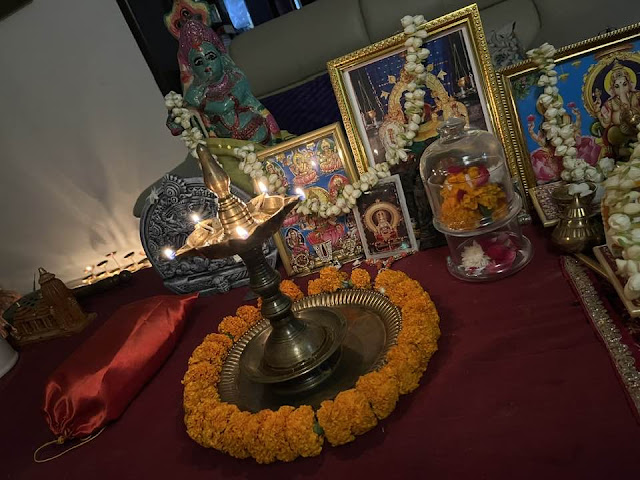What does lighting the lamp signify? And what is the concept of 'Nilavilakku'? In Kerala, most Hindu households light the traditional brass lamp in their puja rooms. This brass lamp is called as 'nilavilakku'. In most Malayali homes, it holds a sacred place. On special occasions such as Vishu and Onam, the Nilavilakku is decorated. [READ: How To Light Deepam At Home]
Sanathana Dharma places the highest importance to 'Agni'. In the words of Sri M, the renowned Himalayan Yogi, "Agni is the fire that purifies our existence. It is the fire for the Yogi in the Manipura Chakra, or known as the Nachiketa Chakra. The fire was named by Yama as Nachiketa Fire. It is one of the greatest symbols you have for the spirit and the soul. Fire always goes upwards, never downwards. It is Agni that takes our wordly desires towards the highest desire that is for the Supreme Being; and then everything else turns to ashes. In every sacrfice and Yajna, we offer everything to Agni. In fact, the Bhagawad Gita mentions the sacred significance of Agni and describes Agni as 'One who knows the Vedas'. We need to light the effulgence of Agni within us. "
Lighting the traditional lamp every morning and evening is an essential practice for Hindu households. In fact, there is a story of how Sai Baba of Shirdi used to seek alms from traders and merchants and request them to give oil so that he could light diyas every evening. Such stories once again establisih the power and divinity of lighting the lamp daily and why it is considered as an essential practice in Hindu homes.
How do you light Deepam at Home?
Make sure the traditional lamp or 'Nilavilakku' is clean and you put at least two cotton wicks on either side and then light the lamp. Five wicks is ideal but if it is difficult to do so daily, make sure two wicks are lit every day. Always chant Ganesha mantra and invoke the blessings of your Kul Devata. Before lighting the lamp, it is important to ensure that one is clean, hygienic and properly dressed.
Can we light the lamp facing the north?
Yes, you can.
Is it wrong to ask desires to be fulfilled while praying after lighting the lamp?
Desires are not bad per se; greed is. As long as your desire is positive and hurts no one, you can seek the fulfilment of your desires. However, it is important that your desire does not include having any negative thoughts regarding others.
In which direction should a vilakku be placed at home?
The north eastern direction is considered ideal.
In which direction should deepam face?
Preferably, it should face the northern or eastern direction.
Can women with periods light the lamp?
The energy of the mind and body are closely inter-connected, particularly when it comes to matters of sadhana. Women can avoid lighting the lamp while having periods. Given how this phase is one that causes considerable physical discomfort and anxieties, it is preferable for other family members to light the lamp.
What time is ideal to light the lamp every day?
While lighting the lamp or 'Nilavillaku', make sure the space around it is clean and not cluttered with unnecessary things. Light incense sticks, place some flowers and pray to your beloved Guru and favourite deities. Maintain timings consistently. Avoid praying at different timings each day. It is said that the deities will await you at the same time every day. However, sadhana and namasmarana are not confined to a specific time alone. In your mind, you can pray and do 'Nama Japa' at all times, including when you are cooking or cleaning. Every action becomes sacred!

Comments